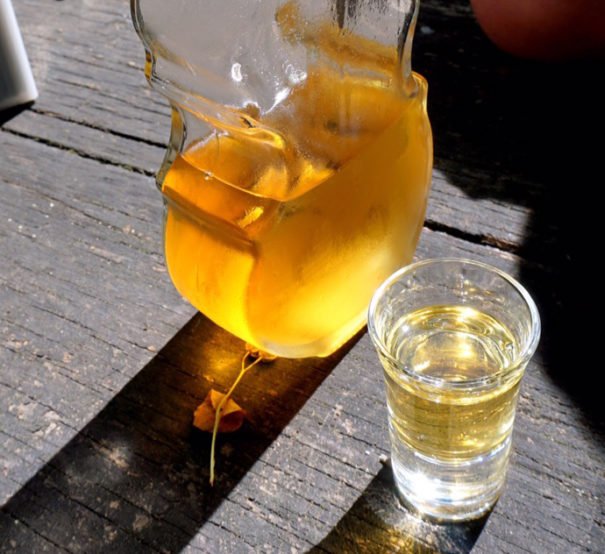
Let’s Mix Bees and Shots and See What Happens

Let’s Mix Bees and Shots and See What Happens
Medica in Slovenia
Jože Veselič isn’t the subtle type. A few seconds after we’re introduced, in the Slovenian village of Čurile, he gets right to the point: “I have three eligible sons.” My left eyebrow rises involuntary and awkward seconds pass before I respond with an embarrassed smile, “Sorry, I am not interested.” A smile forms under his mustache. He shrugs. “Sorry, I have no daughters.” He breaks into a laugh.
Formerly a policeman, Jože takes care of Čebelarstvo Veselič, the family business of beekeeping, a common enterprise in the villages of Bela Krajina. Jože’s love for the bees is clear; one settles on his forehead as he welcomes us into his home, another on the collar of his T-shirt, and four others hover around him. Unlike me, he doesn’t have the impulse to shoo them away.
He motions to a honeycomb in a glass case and invites us to take a closer look at the industrious bees. Bees fly out of a tiny hole in the wooden frame to a nearby hive. “Relax,” he says, noticing my restlessness, “Carniolan bees don’t attack people.”
Five minutes later, we’re in a house with rows of wooden hives stacked against the wall. “It’s relaxing,” says Jože, gently shushing us as he opens the door to a hive. “Listen.” The rest of us exchange glances in silent disagreement. Next, he holds out a sticky honeycomb and explains the harvesting process. Then, he leads us into a tiny room where jars of acacia honey line the shelves.
Jože brings out something from the back shelf. “It’s good for your throat,” he motions to a bottle of yellowish gold liquid, “Medica, it’s medicine.” I’m a little embarrassed that he has noticed me coughing all morning. We sit on wooden benches in the leafy garden, the green hills of Bela Krajina in the distance sprinkled with red-roofed houses. His wife brings out a red tray with shot glasses. He pours the liquid into each glass and presents mine:
“Medica, honey liqueur.” I take a sip while he empties his glass. It tastes like cough syrup. I empty my glass.
We ask if he’s noticed the declining population of bees. “Yes,” he nods grimly. Then pours himself another glass. “It’s the pesticides and the radiation from cell phone communication towers—it affects their sense of direction. When the bees die, we will die.”
“And another?” he pours medica into my glass even as I begin to protest, “for your throat.” It’s 11 a.m. and I am a little tipsy. Three sips and my glass is empty again. The dryness in my throat has disappeared. I look around the table at my companions. We’re an unusual party: six of us, strangers before this morning, and the bees, buzzing incessantly.
Here in Jože’s garden, the storytelling has just begun as he refills our glasses with warm, sweet medica.